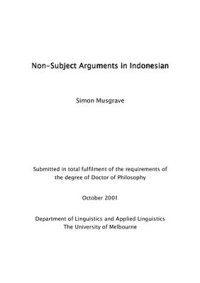
Ebook: Non-Subject Arguments in Indonesian
Author: Musgrave Simon.
- Genre: Linguistics // Foreign
- Tags: Языки и языкознание, Индонезийский и малайский языки, Грамматика
- Language: Indonesian-English
- pdf
Publisher: The University of Melbourne
Publication date: 2001
Number of pages: 264The grammatical function subject can be identified reliably in Bahasa Indonesia (Indonesian), but the same is not true of other clause-level nominal constituents in the language. The tests proposed in previous studies for
identifying an object grammatical function turn out to be unreliable and inconsistent when the full range of data is considered.
This thesis attempts to clarify the problem by examining non-subject arguments in Indonesian in the theoretical framework of Lexical-Functional Grammar. Both the properties associated with the various types of argument and the means by which they are licensed in clauses turn out to be problematic.
Two argument verbs appear in a range of clause types which are related in interesting ways. I argue that it is possible to give a coherent analysis of the system as a whole, treating it as the basic transitive system of the language, when certain relationships are recognised as morphological rather than syntactic. This analysis also reveals similarities between Indonesian and more conservative Austronesian languages such as those of the Philippines. Another type of clause, sometimes referred to as the 'adversative verb' clause type shares an important property with one of the types of transitive clause, that of allowing an oblique argument to appear without a licensing preposition if it is adjoined to the verb which governs it.
Another class of verbs, emotion and cognition verbs, has a non-subject argument which can be either a prepositional phrase or a bare nominal, but in this case the bare nominal is not an oblique argument, adjunction is not the relevant syntactic relation. The only possible analysis of these verbs, maintaining the assumption that the transitive system has been identified, is that they have a subject and a secondary object as their arguments.
I argue that this analysis is implausible, and that the assumption regarding the transitive system must be reconsidered.
Publication date: 2001
Number of pages: 264The grammatical function subject can be identified reliably in Bahasa Indonesia (Indonesian), but the same is not true of other clause-level nominal constituents in the language. The tests proposed in previous studies for
identifying an object grammatical function turn out to be unreliable and inconsistent when the full range of data is considered.
This thesis attempts to clarify the problem by examining non-subject arguments in Indonesian in the theoretical framework of Lexical-Functional Grammar. Both the properties associated with the various types of argument and the means by which they are licensed in clauses turn out to be problematic.
Two argument verbs appear in a range of clause types which are related in interesting ways. I argue that it is possible to give a coherent analysis of the system as a whole, treating it as the basic transitive system of the language, when certain relationships are recognised as morphological rather than syntactic. This analysis also reveals similarities between Indonesian and more conservative Austronesian languages such as those of the Philippines. Another type of clause, sometimes referred to as the 'adversative verb' clause type shares an important property with one of the types of transitive clause, that of allowing an oblique argument to appear without a licensing preposition if it is adjoined to the verb which governs it.
Another class of verbs, emotion and cognition verbs, has a non-subject argument which can be either a prepositional phrase or a bare nominal, but in this case the bare nominal is not an oblique argument, adjunction is not the relevant syntactic relation. The only possible analysis of these verbs, maintaining the assumption that the transitive system has been identified, is that they have a subject and a secondary object as their arguments.
I argue that this analysis is implausible, and that the assumption regarding the transitive system must be reconsidered.
Download the book Non-Subject Arguments in Indonesian for free or read online
Continue reading on any device:

Last viewed books
Related books
{related-news}
Comments (0)